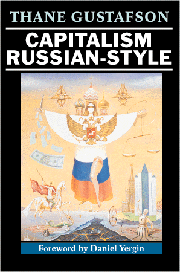Book contents
- Frontmatter
- Contents
- Foreword by Daniel Yergin
- Acknowledgments
- Prologue
- 1 The new Russian Revolution: false start or dead end?
- 2 Creating owners: insider privatization and its consequences
- 3 Wall Street comes to Moscow
- 4 The rise and fall of the private banks
- 5 No capitalism without capitalists: entrepreneurship in the new Russia
- 6 Russia's epidemic of crime
- 7 Toward the rule of law?
- 8 Beyond coping: toward the recovery of Russian society
- 9 The shrinking Russian state and the battle for taxes
- 10 Conclusion: halfway to the market Russia on the eve of the twenty-first century
- Bibliography
- Index
Foreword by Daniel Yergin
Published online by Cambridge University Press: 22 September 2009
- Frontmatter
- Contents
- Foreword by Daniel Yergin
- Acknowledgments
- Prologue
- 1 The new Russian Revolution: false start or dead end?
- 2 Creating owners: insider privatization and its consequences
- 3 Wall Street comes to Moscow
- 4 The rise and fall of the private banks
- 5 No capitalism without capitalists: entrepreneurship in the new Russia
- 6 Russia's epidemic of crime
- 7 Toward the rule of law?
- 8 Beyond coping: toward the recovery of Russian society
- 9 The shrinking Russian state and the battle for taxes
- 10 Conclusion: halfway to the market Russia on the eve of the twenty-first century
- Bibliography
- Index
Summary
As the new millenium begins, one of the biggest questions for the emerging global economy is the role that Russia will play in it. Russia's power and wealth are at their lowest ebb since the 1920s. Yet for how long can it be counted out? Its enormous natural resources and talented people, spanning eleven time zones, and its vast strategic position, argue that Russia could be a major player in tomorrow's world. But in what role? Will Russia be an important and constructive player in building tomorrow's global economy and a world order based on peaceful technology? Or will it be left behind, nursing bitter resentment over a lost empire and a dead ideology, concentrating its meager resources on rebuilding militarily? The answers depend on the outcome of the new Russian revolution. At the beginning of the twenty-first century – almost eighty-five years after the Bolshevik Revolution that sent such shock waves through the twentieth century – Russia is again caught up in a revolution. It is partly political – the effort to establish secure foundations for democracy. And it is partly economic – the struggle to transform the very archetype of the centrally planned economy into a market system that is anchored in the new global economy.
What will be the outcome? That depends on whether Russia can make good on its historic bet to build an open market economy, founded on private property, contract, law, and enterprise, and on the free movement of people, capital, and ideas.
- Type
- Chapter
- Information
- Capitalism Russian-Style , pp. ix - xiiiPublisher: Cambridge University PressPrint publication year: 1999
- 3
- Cited by



